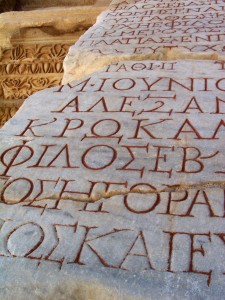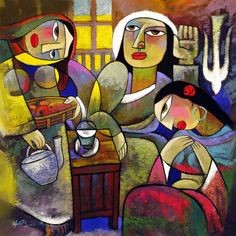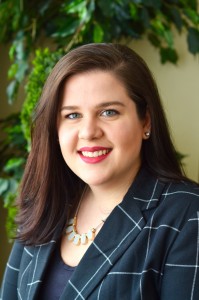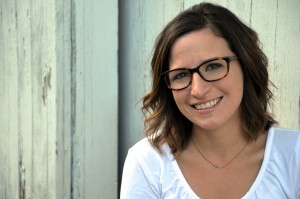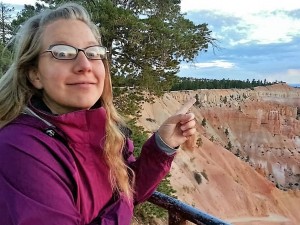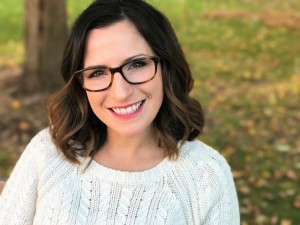 Abby Jones is the pastor of the Covenant Church in Stromsburg, NE. Abby is an advocate for women in leadership, a mom of four girls, and you can read more of her writing at: sustainabletheology.com.
Abby Jones is the pastor of the Covenant Church in Stromsburg, NE. Abby is an advocate for women in leadership, a mom of four girls, and you can read more of her writing at: sustainabletheology.com.
My mom likes to tell me a story about a cold November night when her and my dad threw on their tennis shoes, bundled up in their coats and walked four miles. After the walk, they changed into their pajamas and played Yahtzee. They filled up an entire score card that night, crawling into bed well after midnight. The next morning she woke up in labor and I was born just before lunch.
I do the same thing with my girls, every year I tell them about the events leading up to their birth. It’s always a little embellished, censored, and very polished. Our big stories, the ones we tell often, usually are. We do the same thing at Christmas with the birth story of Jesus, don’t we?
When I think about the story my mom tells, I have to take my dad’s version into consideration when piecing together the events of that night. We do the same thing with Jesus, piecing a few versions together so that we can have enough parts for the kids to play at the Christmas pageant. All the while, skipping over those not so G-Rated details.
Keep your ears open this weekend as Matthew and Luke are blended together, and characters are revealed. Listen for prostitution, foreigners, and scandal. In the beginning of Matthew’s story is the genealogy of Jesus, and in that genealogy five women are listed.
Tamar was a Canaanite woman, married to Judah’s oldest son, Er. Er was evil, so God killed him. Tamar became a widow, and her only hope was for Er’s next oldest brother, Onan to marry her. But Onan refused, so God killed him too. Judah only had one son left, and said that he was too young to marry.
One afternoon, Tamar dressed herself as a prostitute, covered her face and waited by the road for Judah. When he saw her, he thought she was a prostitute, and slept with her. Tamar became pregnant and Judah demanded she be killed for adultery, but she had proof that Judah was the man that slept with her. She gave birth to twins who were recognized as Judah’s sons, the oldest of the twins was Perez in the line of David. (Genesis 38)
Rahab was also a Canaanite woman, living in Jericho when the Israelite spies arrived to survey the land. Rehab was the mother of Boaz. (Joshua 2)
Boaz married Ruth, a Moabite woman who was both barren and widowed. After her first husband died, she went with her mother-in-law to live in Israel. Three generations later, David was born from her lineage. (Ruth)
David became King, and one night was having trouble sleeping. He went out to walk around his roof, when he saw Uriah’s wife, Bathsheba, bathing. She was very beautiful, and he sent a messenger to bring her to the palace. She slept with him, and became pregnant. David sent her husband to the front lines, and Solomon was born to David and Bathsheba. (2 Samuel 11)
And of course, there’s Mary. The poor, young, Jewish girl. The mother whose story we’ve also cinched up. We leave out the details about labor and delivery, keeping the story pretty sterile. One minute Mary is pregnant, the next she’s holding a perfectly swaddled and sleeping baby. We skip everything in-between, and miss some very important details. (Luke 1-2)
We miss the part about it being messy, and painful, and difficult. While it has it’s beauty, it’s also very frightening. It’s such a fragile moment, and every one of us have entered the world this way. Through birth we come, breathing our first breath at the expense of a woman’s pain and sacrifice.
And that’s the way that God chose to enter our world. God chose to enter the world through birth, delivered by the body of a woman, so that all of creation might be redeemed. God put on skin and entered the world the same way we all do. Through our very messy, painful, intimate process, we have the incarnation. God with us.
God chose a lineage littered with prostitutes, foreigners, and scandal to show us that there’s enough room in the family for everyone. God chose to come as a vulnerable, helpless baby, in order to show us what it means to be human. The parts of the birth story we skip over, show us that there is nothing too messy, too broken, or too dark that God won’t enter into in order to set us free.
